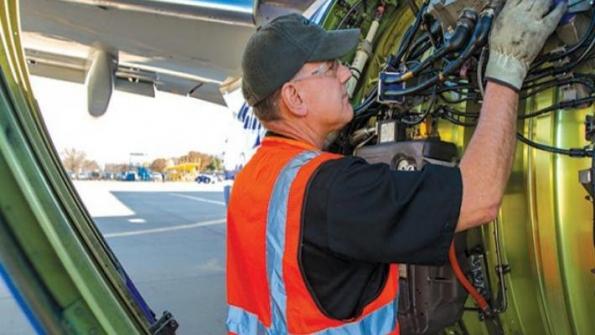U.S. Mechanic Pay Headed Up Before Traffic Collapse, When Will It Return to Trend?

The coronavirus disaster has thrown a huge, nasty wrench onto shop floors across the world, only partly offset in the U.S. by the Coronavirus Aid, Relief, and Economic Security Act (CARES) and other relief options available for airline and some other workers.
But before the wrench was thrown, U.S. aircraft mechanics’ and avionic technicians’ wages were rising, both in nominal and real terms, which is what you would expect in a prosperous industry that needed to attract a new generation of mechanics.
The latest figure from the U.S. Labor Department show average mechanic wages at $32.27 per hour and $67,110 per year in May 2019. Both figures were up 2.9% in current dollars and 1.5% in constant dollars from the year before.
Avionics technician wages were almost the same, $32.20 per hour and $66,970 per year in 2019, both levels up 2.5% in current dollars and 1.1% in real terms.
Mechanic wages spread widely, of course. In 2019, for example, 10% of mechanics made less than about $38,000 a year, while more than 10% made more than $100,000 a year. That latter figure is the cutoff for support under some CARES provisions for small businesses.
Much of the variation in wages traces to the kind of organization a mechanic works for. Airline mechanics are the best paid, averaging $85,480 a year in 2019, up 5.7% in nominal terms and 4.3% in real terms from the year before. Next in line were OEM mechanics at $67,100 last year, up 3.0% in current dollars and 1.6% in real terms from 2018.
Independent mechanics, who face the toughest competition from foreign shops, averaged $56,810 in 2019, up 3.0% and 1.6% from 2018.
What happens when the virus disruption ends, or more likely eases up gradually? Current efforts are concentrating on preserving jobs and any paychecks.
Market logic would predict lower wages or at least slower growth for mechanics wages until full recovery is achieved. That market logic is likely to be most forceful for non-union workers in independent shops, less effective on airline mechanics under bargaining agreements.
Mechanics would obviously like both job security and a return to increasing wages. That may not be possible for many workers for quite a while.





